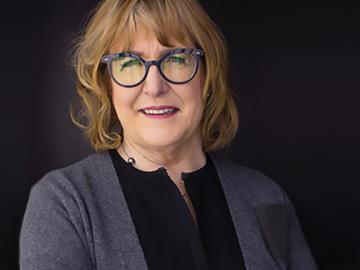Maura O'Neill is a Distinguished Teaching Fellow at the Haas School of Business and was a recipient of the Earl F. Cheit Award for Excellence in Teaching in 2015 and 2016. Dr. O'Neill is the Faculty Director of UC Berkeley Executive Education's Berkeley Executive Leadership program. We recently spoke with Dr. O'Neill about inspiring leadership.
EXEC ED:
You’ve had so much personal experience leading innovative companies as well as working for inspirational leaders; what lessons have you learned from those experiences that shape your perspective on what is needed to be a successful leader? Are there any key attributes or traits needed to be an inspirational leader?
O'NEILL:
- Set the bar exceptionally high for yourself and your team. Not impossibly high or else you will just demoralize them. But quite a bit higher than most of them think is possible. And be really clear on the end goal with lots of degrees of freedom for them to innovate along the way.
- Believe that ordinary people are capable of extraordinary things. Because they are. And collectively, if you motivate and lead a team to punch consistently above their weight the results will astound them, you and everyone else. They will be motivated to take on even bigger challenges. It becomes like an adrenal rush of pure satisfaction and excitement.
- Cull the team. Here is the lesson I learned the hard way. Not everyone is the best match and can thrive in the position they are in- no matter how good a leader you are and how hard you try. They deserve to be in a company and in a position where they can thrive or at least their attitude and talents match up better. The biggest surprise of all for me was that some people just aren’t willing to use their highest and best skills and efforts. There is sometimes nothing I can do to change that. Never make the culling a surprise to the person (give them a reasonable chance) and keep it confidential between that person and his or her leader.
- Listen, Learn and Stay Humble Always. Successful leaders know their team, the marketplace, their customers, their family and even a good novel has something to teach them everyday. If you don’t stay humble, listen intently, consider seriously the input that is all around you and stay open to it, life will smack you. Great leaders also don’t suspend their judgment. As a leader you must be clear and decisive.
EXEC ED:
Is there such a thing as a natural born leader or is that something one can learn or evolve into being? Put another way, is it nature or nurture in terms of being a leader?
O'NEILL:
You absolutely can become a great leader. It takes attitude, caring and most of all a voracious and relentless approach to learning. I devour biographies and autobiographies of leaders, past and present in a wide range of fields. And even the ones we think about as ‘natural born’ stubbed their toes, learned a ton along the way and got better and better. Sure, many of these had great gifts from the beginning. Engineering, oratory, sales, design but to a one they learned to be great leaders.
EXEC ED:
You’ve published and spoken at Ted Talks about the danger of narrow-mindedness and what the outcome of falling into that myopic trap might be. Could you share with us some of your insights on this topic and how recognizing the pitfalls can lead to positive outcomes – both personally and professionally?
O'NEILL:
I will let you in on the big secret: We are all narrow-minded even though we always think it is someone else. That is because from birth we are hard-wired to be narrow-minded. It allows fast and frugal decision making which we need to survive. But it can result in spectacular errors in business, medical and science discovery, politics and our everyday lives. A shortcut to avoiding it- surround yourself with diverse points of view, read and watch materials from a wide range of fields, and embrace dissent in all aspects of your life.
EXEC ED:
What does the research tell us about diversity at the workplace as relates to team performance?
O'NEILL:
It is hard because we like to surround ourselves with people that are like us. It is called homophily and it is all too prevalent in hiring, promotions and board composition. Yet, studies show that companies in the top quartile for racial and ethnic diversity are 35 percent more likely to earn more money than the median in their industry. Catalyst showed that publicly traded companies with the highest representation of women on their senior management teams had a 35-percent higher ROE and a 34-percent higher total return to stockholders than companies with the lowest women’s representation. It pays to build diverse workforces.
EXEC ED:
One of the defining principles here at UC Berkeley-Haas is “question the status quo.” How does that principle relate to leadership, innovation, and business success?
O'NEILL: Wang Labs, Border Group, Digital Equipment, Woolworth’s- all incredible American companies that bit the dust because they failed to ‘question the status quo.’ As Andy Grove, the great former CEO and leader of Intel said, ‘only the paranoid survive’ and embrace your cassandras. The latter relates to those people in your organization that are telling you that you are about to miss a big turn in the road. Question the status quo is at the center of an innovation culture.
EXEC ED:
What types of organizational cultures foster high performance as well as loyalty and retention of employees?
O'NEILL:
Trust, empathy, transparency, clarity of goals, relentless focus on performance, acceptance of failure and expectation of iteration and belief in nothing less than excellence.
EXEC ED:
You’re teaching UC Berkeley’s ExecEd flagship five-day program on Executive Leadership. Why are you excited about this program and what do you think participants will get from this program that is different from other such leadership programs? O'NEILL:
I am excited about teaching this Executive Leadership Program because I know we can help executives take their careers and their organizations to new heights. All of us have a bunch of hopes and dreams. We wonder whether they are possible. We often don’t take the time to be deliberate about reflecting on what additionally we could learn to facilitate the next steps and come up with a specific plan to make it happen. Our aim with this program is five days to change someone’s life- pure and simple. I am about curating leaders who want to tackle the enormous challenges facing start-ups, major companies, social agencies and governments, here and abroad. Together we can.


